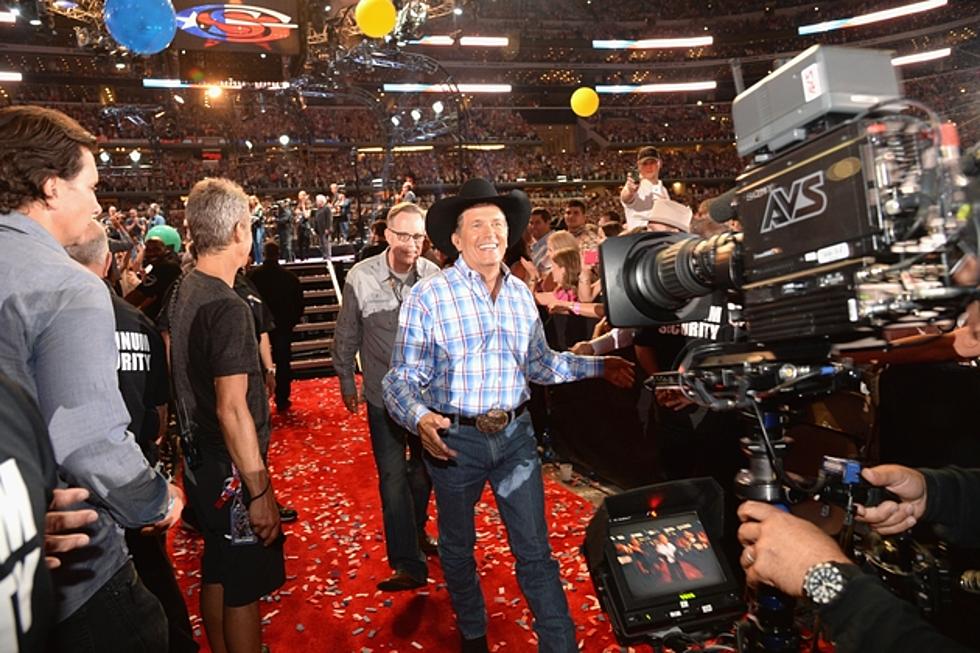
George Strait: The End of an Era
When George Strait performed the final concert of his touring career on June 7 in Arlington, Texas, it signaled the end of an era not only for the King of Country, but for the entire genre.
Strait drew 104,793 fans to AT&T Stadium for the final date of his the Cowboy Rides Away Tour, breaking an indoor concert attendance record for North America that had stood since 1981, when the Rolling Stones drew 87,500 fans to the Louisiana Superdome.
The legendary troubadour performed a massive three-hour, 40-song set that included 20 No. 1 hits, but he could have played for more than twice that long and not included all of his best-known songs. Since scoring his first hit single, 'Unwound,' in 1981, Strait has gone on to release a record 60 No. 1 singles.
He has also sold more than 100 million units, won Entertainer of the Year from both the CMA and ACM multiple times, and been inducted into the Country Music Hall of Fame, among many other accolades.
Those are impressive statistics, but they're all the more impressive when you consider that Strait accomplished all of that while steadfastly refusing to play by the country music rulebook.
Unlike the vast majority of other country stars, Strait chose not to live in Nashville, where it's routine for even the biggest names to spend their days and nights attending an endless series of charity events, listening parties, record release parties, No. 1 parties, tour launch parties and so on and on and on. Each of which is also, naturally, well-attended by photographers and members of the press, which positions those stars to garner more coverage for whatever projects they have on the slate, while also giving the press more material with which to feed the public's seemingly inexhaustible appetite for new details about their country favorites.
He's never really been the subject of tabloid headlines, or dragged across the internet in embarrassing details about his private life ... in fact, perhaps the only thing 'sensational' about George Strait is the music he has made over the years.
Strait has never really done any of that. In fact, compared to most of his fellow stars, he might as well have fallen off the planet between projects, so low was his public profile when he wasn't working. And even when Strait is promoting a new project, it's not like he's out granting slews of interviews -- he's always been very selective about his appearances.
Think about it -- you're not going to see George Strait goofing around with Jimmy Kimmel, or in a cooking segment on 'The View,' or crying about his problems to Barbara Walters. Despite being one of the biggest, most consistently successful stars country music has ever seen, he's never really been the subject of tabloid headlines, or dragged across the internet in embarrassing details about his private life.
That's because there's really nothing there. Strait is hardly some hard-living, groupie-crazed road dog. He's been married to his wife, Norma, since before he rose to fame, and the couple have enjoyed a remarkably low-key life together, mostly away from the spotlight. In fact, perhaps the only thing "sensational" about George Strait is the music he has made over the years.
It's been written and said that Strait's music has remained largely the same down throughout his entire career, but that's just simply not true. Though he has definitely adhered stylistically to a tried-and-true approach in terms of certain elements that tie all of his work together, if you lay Strait's songs end to end, there is a definite and undeniable progression, both in song choices and production, though it's subtle.
Rather than try to get fans to accept a dramatic shift -- could you imagine, for instance, Strait recording a 'bro-country' truck song and asking a rapper to join him, or using vocal tuning as some sort of effect in a dance-type single? -- Strait has changed slowly over decades, in increments that are small enough that they go unnoticed at the time. And though he's never been one to embrace flash-in-the-pan trends at radio, he has definitely continued to keep pace with the times, even if he's done so while adhering to a decidedly traditionalist slant.
You can't reasonably say that 'Amarillo by Morning' and 'Carrying Your Love With Me' are the same, or that 'Write This Down' particularly sounds like 'The Chair,' for instance, but it's not a stretch to think that they are the consistent work of the same artist. And that's really the secret to Strait's success, which has seen him place a Top 10 single every year for 30 years.
While so many of his contemporaries and peers are out trying to make news, and chasing the latest trends, and sometimes embarrassing themselves and alienating segments of their core audience in the process, Strait has built one of the successful careers in country music history around a surprisingly simple formula: find the best songs out there that fit your style, record them in arrangements that are not too obviously tied to any one period, and then go out and promote them in a way that keeps the focus on the music. Then repeat. Then repeat again, and again, and again -- until you wind up with more great songs in your catalog than any other artist in country music history.
Could you imagine Strait recording a 'bro-country' truck song and asking a rapper to join him, or using vocal tuning as some sort of effect in a dance-type single?
It's that kind of integrity that has kept Strait's loyal fans coming back for more all these years, and though he's retired from touring, he's vowed to continue recording, and we can look forward to at least five more albums from him, according to a new contract that he has signed with MCA, his longtime label.
Then why does it feel like the end of an era?
Maybe because radio has changed so rapidly in such a relatively short period of time. Maybe because Strait is really the only person left from his era who's still capable of garnering mass radio play, in an era where superstar names like Vince Gill, Alan Jackson, Trace Adkins and more have begun to shift their focus toward passion projects that are not slanted toward the trends at country radio.
Maybe it's because he's one of the last of a dying breed of traditionalists, and as they vanish, the roots of the genre appear to be vanishing with them, to be replaced by more contemporary artists and styles.
“It’s always been that constant pop-country battle. I don’t think it’s ever going to change,” Jackson said with resignation in September 2013. “What makes me sad today is that I think the real country, real roots-y traditional stuff, may be gone. I don’t know if it’ll ever be back on mainstream radio. You can’t get it played anymore.”
He adds, “It’s not that I’m against all that’s out there. There’s some good music, good songwriting and good artists out there, but there’s really no country stuff left.”
“Traditional country music died,” Clay Walker acknowledged in December. “I think that George Strait winning Entertainer of the Year at the CMAs was, to me, a symbolic and a real closing of the door. It was, to me, as if the industry was saying, ‘Thank you George for everything that you’ve meant to traditional country music.’”
But if Strait's semi-retirement is indeed the closing of a chapter, he's earned the right to rest, or to work as much as he wants, or to do or not do whatever comes next or doesn't. And though there will never be another like him, we wouldn't want that, anyway -- George Strait always has been, and always will be, a one-of-a-kind.
More From TheBoot









